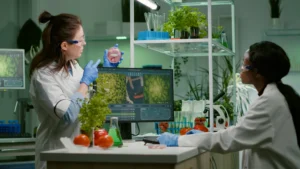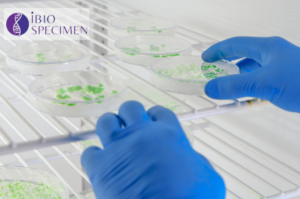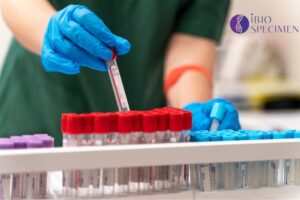- +1 (408)580-1396
- info@iBioSpecimen.com
Exploring the Science of Matched Samples
- November 17, 2023
Introduction
Have you ever wondered about the intricate world of biospecimens and how they contribute to scientific breakthroughs? In this article, we’ll delve into the fascinating realm of Matched Biospecimen Sets in USA, demystifying the science behind matched samples and their crucial role in advancing medical research. So, grab your metaphorical lab coat, and let’s embark on this scientific journey together!
The Basics of Biospecimens
Biospecimens are samples of biological material, such as blood, tissue, or urine, collected from individuals. These specimens are like biological treasure troves, holding valuable information about our health and genetic makeup.
Key Point: Biospecimens are the foundation of medical research, providing scientists with vital clues for understanding diseases.
Understanding Matched Samples
Matching biospecimens involves pairing samples from individuals with similar characteristics. This process aids researchers in isolating specific factors contributing to various conditions, making the study more accurate and reliable.
Key Point: Matched samples act as a magnifying glass, helping scientists focus on specific aspects of research.

Significance in Medical Research
The use of matched biospecimen sets is a game-changer in medical research. By comparing samples from individuals with and without a particular condition, researchers can pinpoint genetic variations or biomarkers associated with diseases.
Key Point: Matched samples pave the way for targeted therapies and personalized medicine.
Challenges in Biospecimen Matching
While matching biospecimens is revolutionary, it comes with its own set of challenges. Ensuring the samples truly match in all relevant aspects requires meticulous attention to detail.
Key Point: Precision is paramount; even slight discrepancies can impact the accuracy of research findings.
Ethical Considerations
The ethical use of biospecimens is crucial. Researchers must obtain informed consent from individuals donating samples, ensuring transparency and respect for privacy.
Key Point: Ethical guidelines protect the rights and dignity of sample donors.
How Matched Biospecimens Drive Precision Medicine
Precision medicine aims to tailor medical treatment to the individual characteristics of each patient. Matched biospecimen sets play a pivotal role in achieving this by providing the data needed for personalized approaches to healthcare.
Key Point: Matched biospecimens bring us closer to healthcare that is as unique as our DNA.
Advancements in Biospecimen Matching Technology
Technological advancements have revolutionized biospecimen matching. Automated processes and sophisticated algorithms enable faster and more accurate matching, accelerating the pace of research.
Key Point: Technology is the unsung hero, propelling biospecimen matching into the future.
Collaborations and Data Sharing
In the world of biospecimen matching, collaboration is key. Research institutions, healthcare providers, and biobanks work together to build extensive databases, fostering a collective effort toward medical breakthroughs.
Key Point: Shared knowledge is a catalyst for scientific progress.
The Future of Matched Biospecimen Sets
As technology advances, so does the potential of Matched Biospecimen Sets. The future holds promises of even more precise matching, opening doors to discoveries that were once unimaginable.
Key Point: The future of biospecimen matching is a beacon of hope for medical advancements.
Real-life Impact: Success Stories
Let’s explore real-life instances where matched biospecimen sets have made a tangible impact. From uncovering the genetic basis of diseases to developing targeted therapies, these success stories highlight the practical benefits of biospecimen matching.
Key Point: Behind every matched biospecimen set is a potential breakthrough waiting to happen.
Matching Beyond Genomics: Proteomics and Beyond
Biospecimen matching isn’t limited to genomics. The emerging field of proteomics focuses on studying proteins, providing a more comprehensive understanding of diseases and potential treatment targets.
Key Point: Matching goes beyond genes, embracing the complexity of proteins and other biomolecules.
Accessible Matched Samples for Research Institutions
Ensuring accessibility to matched biospecimens is crucial for research institutions. Initiatives promoting open access to biobanks and collaboration between institutions democratize scientific progress.
Key Point: Everyone should have the opportunity to contribute to and benefit from biospecimen matching research.
Bridging Gaps: Community Involvement in Biospecimen Matching
Community involvement is essential for the success of biospecimen matching initiatives. Building trust and fostering engagement with diverse communities enhance the inclusivity and representativeness of research.
Key Point: Communities are not just donors; they are active participants in advancing scientific knowledge.
Educational Initiatives: Spreading Awareness
Educating the public about biospecimen matching is crucial. Increasing awareness fosters understanding and support, ensuring a more informed and engaged society.
Key Point: Knowledge is power, and an informed public is a supportive ally in scientific endeavors.
Conclusion
In conclusion, matched biospecimen sets are the linchpin of cutting-edge medical research. From unraveling the mysteries of genetic diseases to propelling us toward personalized medicine, these matched samples are transforming the landscape of healthcare.
Key Point: The journey of matched biospecimen sets is a continuous exploration, paving the way for a healthier and more informed future.
FAQs
1. What exactly are biospecimens?
Biospecimens are biological materials, such as blood or tissue samples, collected from individuals and used in medical research.
2. How do matched biospecimen sets contribute to precision medicine?
Matched biospecimen sets enable researchers to compare samples from individuals with and without specific conditions, identifying genetic variations and biomarkers crucial for personalized medicine.
3. Are there challenges in matching biospecimens?
Yes, ensuring precise matching is challenging and requires meticulous attention to detail to avoid discrepancies that could impact research accuracy.
4. Why is community involvement crucial in biospecimen matching?
Community involvement builds trust and ensures diverse representation, enhancing the inclusivity and reliability of biospecimen matching research.
5. What does the future hold for matched biospecimen sets?
The future promises advancements in technology for even more precise matching, unlocking new possibilities for medical discoveries.



